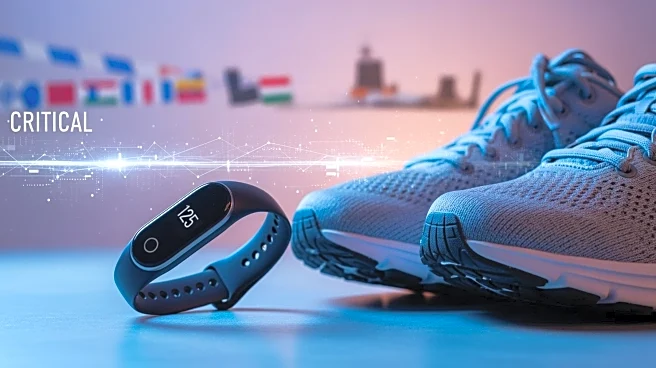What's Happening?
The landscape of athletic training is undergoing a significant transformation with the integration of advanced technology. Everyday athletes now have access to personalized wellness tools that were once reserved for elite professionals. Wearable devices
such as WHOOP, Garmin, Apple Watch, Oura, Morpheus, and EightSleep are providing real-time feedback on critical metrics like sleep quality, recovery, heart rate variability, and daily strain. This data-driven approach allows athletes to make informed decisions about their training intensity and recovery needs, reducing the risk of injury and optimizing performance. Additionally, the importance of gut health is being recognized as a key factor in athletic performance. The microbiome's role in immune system regulation, inflammation modulation, and recovery is being highlighted, with experts like Professor Robert Clancy emphasizing its impact on training outcomes. AI-driven coaching platforms are also gaining traction, offering adaptive training programs that evolve based on individual readiness, recovery, and stress levels.
Why It's Important?
The integration of technology into athletic training is crucial for enhancing performance and minimizing injuries. By leveraging wearables and AI-driven coaching, athletes can train smarter, not harder, leading to more efficient progress and fewer setbacks. The focus on gut health as a performance variable underscores the holistic approach to athlete wellness, emphasizing the interconnectedness of physical health and training outcomes. This shift towards personalized, data-driven training is democratizing access to elite-level insights, allowing everyday athletes to optimize their routines and achieve their goals more effectively. The broader impact includes potential reductions in healthcare costs related to sports injuries and improved overall health outcomes for athletes who adopt these technologies.
What's Next?
As technology continues to advance, the integration of more sophisticated AI algorithms and wearable devices is expected to further refine training programs. The ongoing research into the microbiome's impact on athletic performance may lead to new dietary and supplementation strategies tailored to individual needs. Stakeholders such as sports organizations, healthcare providers, and tech companies are likely to invest in developing and promoting these technologies, potentially leading to new partnerships and innovations in the field of sports science. The adoption of these tools by a wider audience could also influence public health policies related to physical fitness and wellness.
Beyond the Headlines
The ethical implications of using AI and data-driven technologies in sports training are worth considering. Issues related to data privacy, consent, and the potential for technology to create disparities in access to training resources may arise. Additionally, the cultural shift towards technology-driven training may challenge traditional coaching methods and philosophies, prompting discussions about the balance between human intuition and machine learning in sports.















